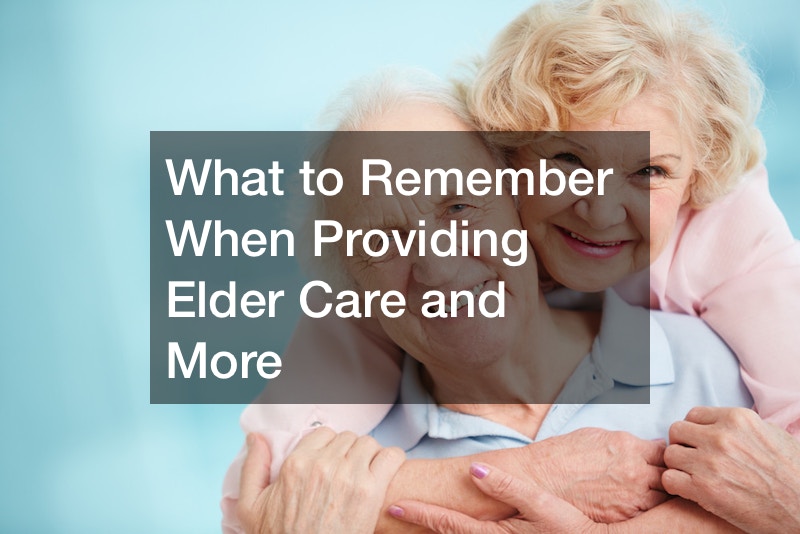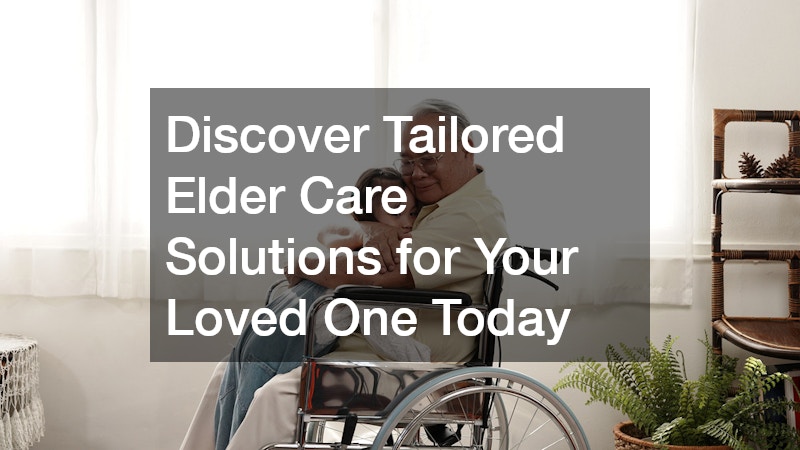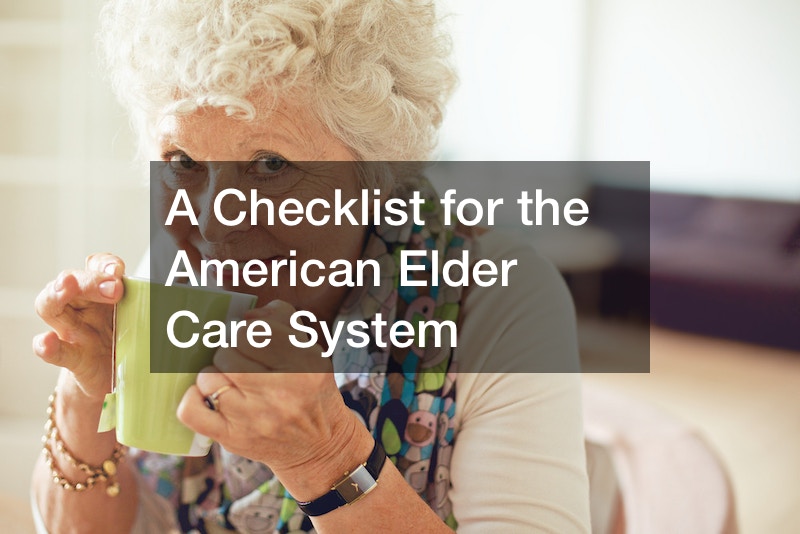The Administration for Community Living reports show that 70% of people above 65 years require long-term care support for the rest of their lives. Caring for elderly family members is one of the most sacrificial but rewarding things you can do. It requires dedication, patience, and effort.
Caring for older people can overwhelm you. If you have other responsibilities, it can be even more challenging. However, a checklist of things to remember can make the process smoother and less stressful. Just keep in mind that it takes more than medication and treatment to keep them healthy. Here are ten essential things to remember when providing elder care and more.
Ensure That Your Loved Ones Have an Estate Plan
Every family needs an estate plan. You need a documented plan outlining asset sharing and health care proxy. Older people often need someone to help them make healthcare decisions.
Unpleasant as it might be to think about, you must prepare for life eventuality, be it incapacitation or death. According to CNBC, about 67% of Americans don’t have an estate plan. Without such documentation, caring for an aging loved one can be complicated, especially with no health care proxy. Therefore, think about who can make healthy decisions for the person if they ever get sick and can’t convey their wishes.
Moreover, apart from documenting a will, an estate plan can help you decide how to handle health care expenses. Who pays for insurance premiums? Who pays for out-of-pocket expenses? It is not strange to have family members fighting over who should settle what and how.
You can avoid all that confusion by having a clear estate plan. Your loved one can rest assured (pun unintended) that their estate will go to the rightful heirs. Ensure you seek legal help from an estate planning attorney to get the process started and rolling.
Know About Your Loved One’s Medicare Plan

Medical insurance coverages have limitations. Some cover older adults; others don’t. It is prudent to know the inclusions of your loved one’s cover.
For example, if your loved one has a health care plan from a private medicare insurance company, they may still have to pay for some services. This is where co-pays and deductibles come in. Therefore, ensure you understand the fine print of your loved one’s medical cover. Discuss it with the provider to clearly understand what it includes and might not. This information will help you plan better for any out-of-pocket expenses.
However, you can opt for government-funded Medicare. This federal health insurance program covers individuals who are 65 years or older. Currently, it has over 65,748,297 Americans as of 2023, according to a Centers for Medicare & Medicaid Services report. That means people trust its services and can afford it.
Medicare has one of the most comprehensive healthcare coverages for older adults. It includes hospital insurance, medicare advantage plans, medical insurance, and prescription drug coverage. However, do not assume it covers everything your loved ones need. When it comes to elder care and more, it’s best to do thorough research and plan beforehand.
Take Your Loved One to an Appointment When They Have Pain
Elder care and more involves being there for your loved ones in times of need. It’s no secret that old age comes with complications, including body aches and pains. The number of chronic pain cases in older adults only increases as they age, according to a study by the National Institute of Health.
Some of the most prevalent types of pain in older adults include arthritis, osteoporosis pain, and hip fracture pain. And your loved ones might suffer multiple pain issues at once. Severe body pain can be excruciating and affect their mobility and communication abilities.
As such, you should accompany them to the pain specialist appointments. Through medication and non-invasive treatments, specialists can help alleviate their discomfort and pain, enhancing their quality of life. Ensure you plan how to handle appointments and emergency cases. As a caregiver, you should also get involved instead of leaving them to deal with the engagements alone.
Prioritize Physical Therapy

Providing elder care and more also means caring for their physical health. Physical therapy care is vital for older adults. It helps them maintain their mobility and independence. Old age limits movements; without proper exercise, bodies become stiffer and lose functionality.
With reduced mobility, chances of falling increase. Trip and fall incidents could lead to injury and bone fracture. Falling is the leading cause of hip fracture in the elderly population, according to the University of Rochester Medical Center.
Physical therapy varies depending on the individual’s needs. It could include exercises, massages, and other techniques such as cold or heat treatment, warm water therapy, or ultrasound. The primary goal is to promote strength, balance, and coordination.
As a caregiver, you can assist your loved one in setting up an exercise routine and ensure they stick to it. Physical therapy is also crucial for senior citizens recovering from surgery and injury. Ensure the physical therapist knows any medical conditions and medications they take.
However, before committing your loved ones to a physical therapist, ensure they have any of the nine certifications from the American Board of Physical Therapy Specialties. These include Cardiovascular and Pulmonary, Clinical Electrophysiology, Oncology, Orthopedics, Geriatrics, Neurology, Pediatrics, Sports, and Women’s Health.
Look Into Skin Care Support
Part of elder care and more also involves caring for their skin. Age can take a toll on the skin, leading to wrinkles, dryness, and age spots. If not managed, it leads to severe itching and bleeding. In extreme cases, it can cause visible painful cracks on the face.
Naturally, the skin becomes less oily, thinner, and elastic with advanced age. The problems that arise from these changes include dryness, itching, skin tears, and age spots. Sometimes, these age spots can become cancerous. At this point in the life of your loved one, seeking a specialist in dermatology is more critical than ever.
A professional dermatologist can help create a skincare routine. It will involve moisturizing daily with fragrance-free lotions or creams containing lanolin or petrolatum. Such products retain moisture better than other ingredients. You must also encourage the older family members to drink plenty of water and other fluids.
It is also essential to avoid long, hot showers and baths, which strip natural oil from the skin. Additionally, ensure they use mild soaps without alcohol, harsh chemicals, or fragrances. What’s more? They should also avoid too much sun exposure. Get them sunscreen and a hat if they must go outside.
Moreover, the National Institute of Aging recommends getting your elderly loved ones checked for skin cancer at least once per month. That’s why you need to engage a dermatologist. These experts can recognize drastic skin condition changes and advise on proper medical care.
Visit the Dentist Regularly for Teeth Concerns

Elder care and more encompasses more than just your loved one’s physical and systematic health. It also involves ensuring their overall well-being, including oral health. One of the most common issues among seniors is tooth loss.
Tooth loss among seniors is almost a crisis. Nearly one in every five adults above 65 years has lost all their teeth, according to the Centers for Disease Control (CDC). Not only does this affect their eating ability, but it can also impair their speaking abilities and affect jawbone density. If not addressed promptly, it could lead to facial distortion.
Tooth loss among elderly citizens emanates from decay, gum disease, poor nutrition, weak bones, and trauma. That’s why regular visits to a cosmetic dentistry professional are crucial. With professional help, your loved one can retain an attractive smile and enjoy a good quality of life. This brings us to the next point.
Discuss Different Options for Tooth Replacement
What is the way forward after finding out older family members have lost their teeth? It’s easy to ignore or accept tooth loss among seniors as a natural part of aging. However, this shouldn’t be the case. It should be part of your elder care and more.
While there are various ways to prevent tooth loss, sometimes it’s inevitable. Therefore, it’s essential to discuss replacement options with your loved one, preferably with the assistance of a dental practitioner. One popular option is dental implants. They are long-lasting and provide a more permanent solution. A dentist can customize implants to fit perfectly that look and feel natural.
Teeth implants are excellent in the sense that they don’t need the support of other teeth. They restore full chewing capability, making eating enjoyable again. They are not painful, either. Additionally, implants prevent bone loss and help preserve facial structure, reducing the chances of developing a sunken look.
Another tooth replacement option is dentures. They are affordable but not permanently placed. However, they still provide a good solution for seniors with multiple teeth missing. Dentures also help restore facial structure and improve appearance.
Both of these options are great. But, discussing with a dentist can help you decide which will best fit your loved one. Remember, some medical conditions and medications can affect tooth replacement options. For instance, those with weak bones may not be suitable candidates for implants. Additionally, implants can be relatively expensive.
Install a Generator to Avoid Future Problems

A generator is essential to elder care and more. With the risk of arthritis and other physical conditions, power outages can be dangerous for seniors. The last thing an older person wants is a blackout in the middle of a cold winter morning.
A standby power source is imperative for an aging relative at home. It is even more critical for seniors using medical equipment that requires electricity. A power outage can be life-threatening, especially for oxygen tanks or other necessary devices. Invest in generator installation to ensure an uninterrupted power supply.
But how do you select the right generator for your elderly loved one? Consider the size of their home and the medical equipment they can support. Ensure that the generator can provide enough power for all essential appliances and devices. Also, consider fuel options – propane or natural gas-powered ones are more convenient than gasoline-powered ones.
There are many home generator brands out there. It can be challenging to choose the right one. Don’t fret – check out this Forbes review of the best generators of November 2023.
Go to Your Loved One’s Vet With Their Pet
A quality package of elder care and more includes taking care of what they love and value. If they have a pet, ensure it has access to proper vet care. Since seniors can’t take these furry friends for regular checkups (like they used to), ensure you are available to assist.
Pet care is essential for the furbaby’s health and that of their owners. For instance, the four-legged companions carry fleas and other pests that may cause illnesses, especially in older adults with a weakened immune system. According to Johns Hopkins Medicine, cat scratch diseases come from a bacterial infection in cats’ saliva.
And it’s not the only infection your elderly might catch from their furry friend. They can get rabies, tapeworm, campylobacter, toxoplasmosis, and ringworms. And these diseases are not rare. According to the University of Chicago Medicine, nearly six million Americans have toxoplasmosis. While a young, healthy person can easily fight such infections, an older person’s body is vulnerable.
Therefore, investing in your loved one’s pet’s health is, by extension, caring for their health. You can avoid many of these complications by visiting veterinarians regularly.
Create a Plan With Your Loved One
Death is an uncomfortable topic, but it is crucial to have these conversations with your loved ones. You will find that most people are willing to talk about it. In fact, according to the Funeral and Memorial Information Council, 69% of Americans wish to arrange their funerals.
As difficult as it may be, an end-of-life plan should be part of your elder care and more. You can discuss important topics, funeral plans, and having a will. You may also discuss final care preferences and appoint someone to make medical decisions. Having a plan will save you time and prevent any confusion or disagreements that may arise when the inevitable happens. It’s also essential to ensure you meet the final wishes of your loved one.
Having an elderly care and more checklist doesn’t have to be complicated. By taking the time and effort to create a plan with your loved ones, you can ensure they receive the best care possible. Amid the emotions, a proper plan can bring peace of mind and make decision-making more manageable.


